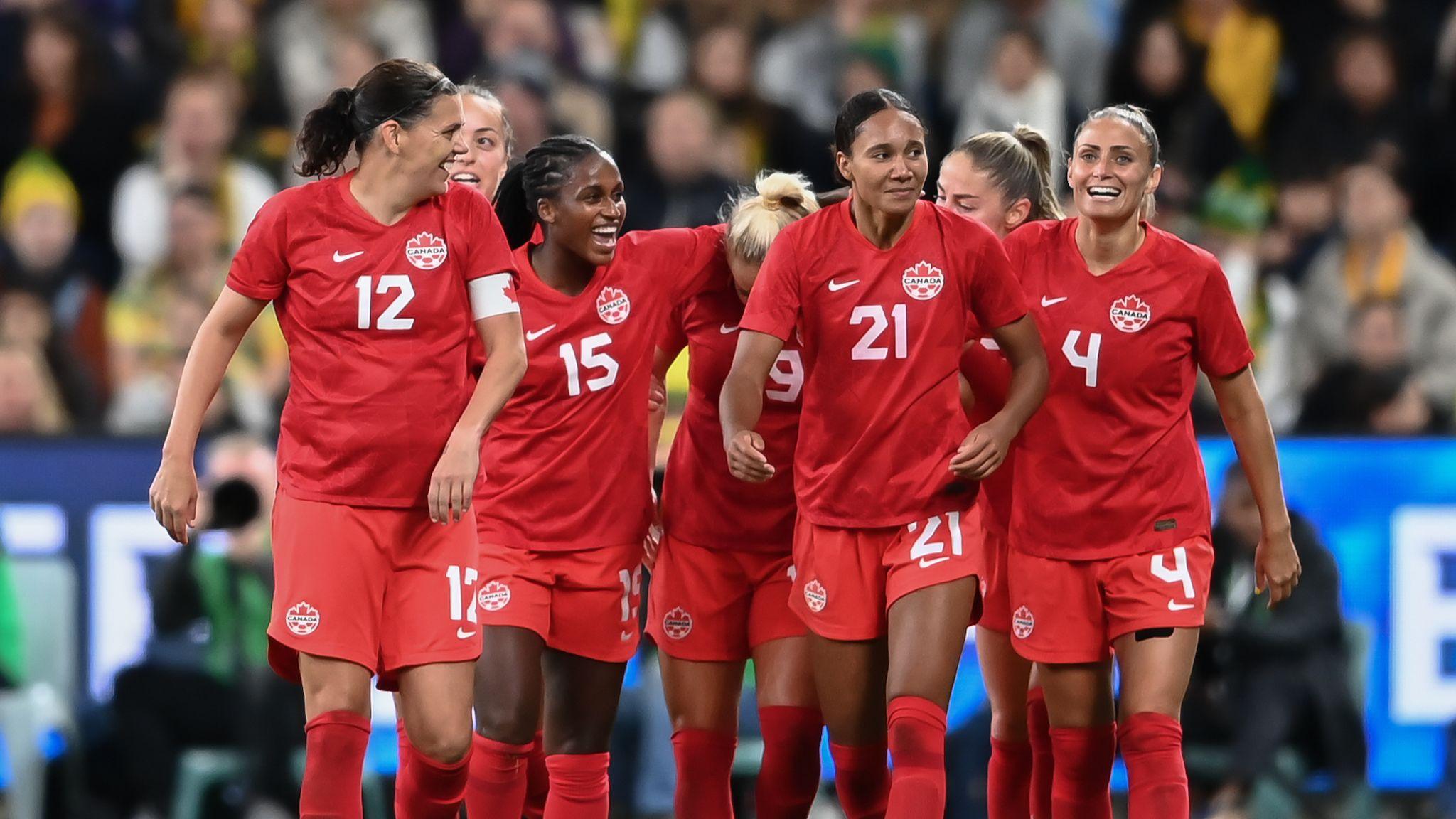Women's World Cup 2023: Is this Canada's year?
- Published
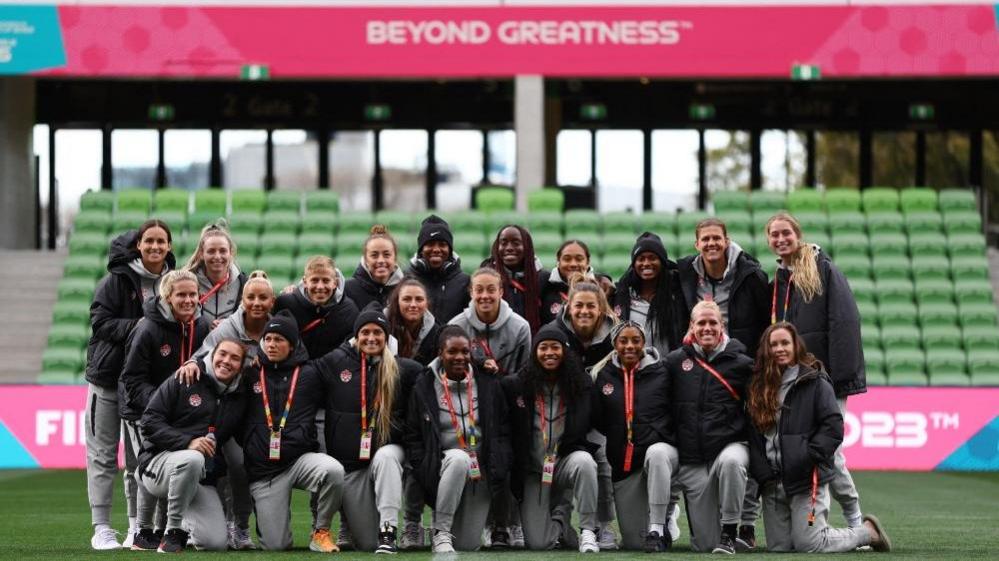
Before the 2020 Olympics in Tokyo, the Canadian women's football coach Bev Priestman gave her team a three-word motto: change the colour.
For two Olympics in a row, in London and Rio, the team had medalled, claiming a respectable bronze both times.
But the third-place results helped cement Canada's position internationally as a sometimes forgettable squad, despite the team's consistent strength, growing national popularity, and its star captain, Christine Sinclair - the all-time leading goal scorer in international football, across both male and female leagues.
And then two years ago, at the Tokyo games, the Canadians did it. They delivered on Ms Priestman's ambition, changing the colour after defeating Sweden in a penalty shootout.
"We are no longer always a bridesmaid," said Sonja Missio, founder of the online soccer publication Unusual Efforts and a diehard Canada football fan. "We have a gold medal from the Olympics."
No longer a bridesmaid and, arguably, never stronger, the team is heading in to its eighth Women's World Cup, this one in Australia and New Zealand.
So far, the World Cup title - football's biggest trophy - has eluded them. Is this their year?
In Canada, football's popularity has long lagged behind the country's national pastime.
"People who love soccer have always respected this programme," said Andi Petrillo, a sports journalist for CBC and OneSoccer. "The knock is just that we live in a country where we love hockey... [football] is just not the first, second or third popular sport."
But under head coach John Herdman, who led the women's team from 2011 to 2018, the team started to rack up results, including the first-ever Olympic medal for a Canadian football team.
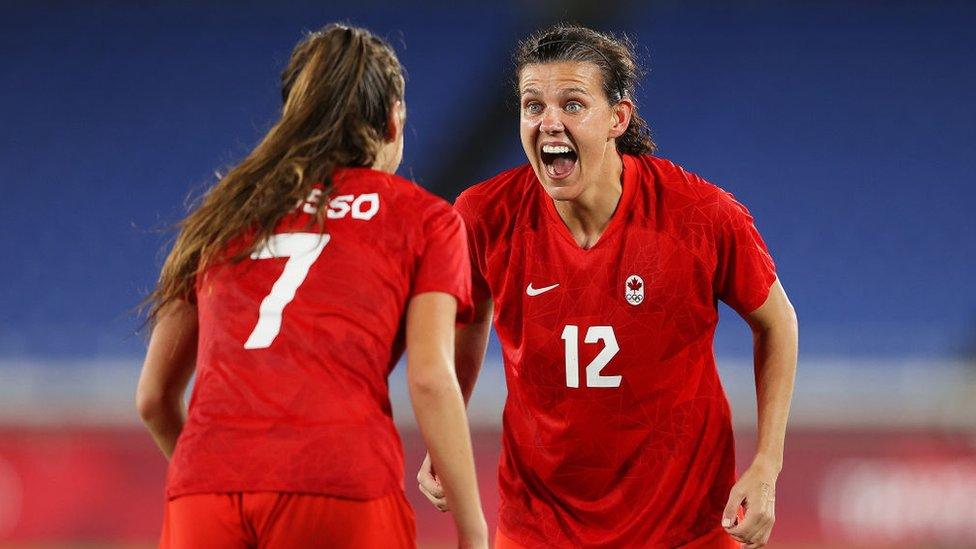
Christine Sinclair, Canada's long-time star, celebrates the team's win in Tokyo with teammate Julia Grosso
By the time they reached Tokyo, the squad was led by new head coach Ms Priestman, 37, who steered the team to their Olympic gold and - maybe just as importantly - their first victory over their US rivals in 20 years.
"The players love her," Ms Petrillo said of Ms Priestman. "She's a grand motivator... and she was pretty fearless at the Olympics when she needed to make substitutions."
Ms Priestman will be at the helm again in Australia and New Zealand, perhaps the first World Cup where Canada is seen as a serious contender.
For the sixth time, the women's team will be led on the field by Ms Sinclair. Canada's striker and football's media shy superstar, Ms Sinclair has been dominant for more than two decades.
"I mean, Christine Sinclair is Canadian soccer," said Clare Rustad, a former player for the national team and now a football analyst for TSN.
"And apart from being one of the best strikers to ever play the game she is the best goal scorers to ever play the game."
The goals are more rare for the prolific scorer, now 40, but she is still expected to be a gamechanger for the team.
And this time around she will be supporter by a deep roster.
There's midfielder Jessie Fleming, who made her World Cup debut at just 17 years old, and has emerged as the new face of the team. Now 25, Ms Fleming is an aggressive and creative midfielder, with 115 caps and 19 goals already on her resume.
"I call her the baby-faced assassin," Ms Petrillo said. "She's absolutely lethal, nothing seems to rattle her."
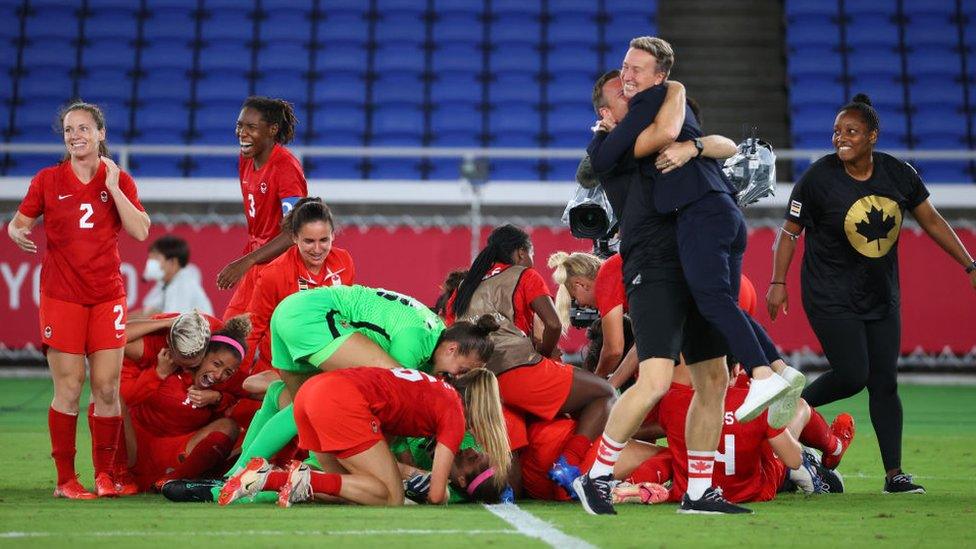
Coach Bev Priestman celebrates with the team after their Olympic Gold
Goalkeeper Kailen Sheridan will also be a player to watch, especially given Canada's reputation as a defense-first squad, along with veteran midfielders Sophie Schmidt and Quinn (who goes by one name), who made history in Tokyo as the first openly transgender and nonbinary athlete to earn at medal at the games.
"Out of recent World Cups for Canada, in terms of focus, player availability, this is the time," said Kristin Knowles, who is part of Canada's national fan group, The Voyageurs. "If there's any time they're going to do it, it's now."
But the seventh-ranked Canada has also had its stumbles.
Defensively, Canada is one of the best teams in the world. But the squad's goal-scoring has often fallen short.
In Tokyo, the team won largely by shutting rivals out, beating the US in the semi-finals by just one goal - a penalty kick - and taking the gold against Sweden the same way.
"I don't think we're going to rely on one individual player [to score]," Ms Priestman told the CBC last week.
"In the women's game now, they're not huge blow-out scores that win World Cups or Olympic Games. It's one goal... we'll have that in our locker and then we'll defend for our lives."
Canada has also lost some of its strongest players to injuries, including forward Janine Beckie and midfielder Desiree Scott. Others, like Nichelle Prince and Deanne Rose, have recently returned to the field after recovering from injuries.
The team has been plagued by battles off the pitch too. The Canadian women have been in a tense and prolonged battle with Canada Soccer over budget cuts and equal pay.
In February of this year, squad announced it would strike, citing "significant cuts" to the national team programmes.
"Until this is resolved, I can't represent this federation," Ms Sinclair told TSN at the time. "I'm such a competitor, it breaks my heart and kills me to be actually saying those words out loud."
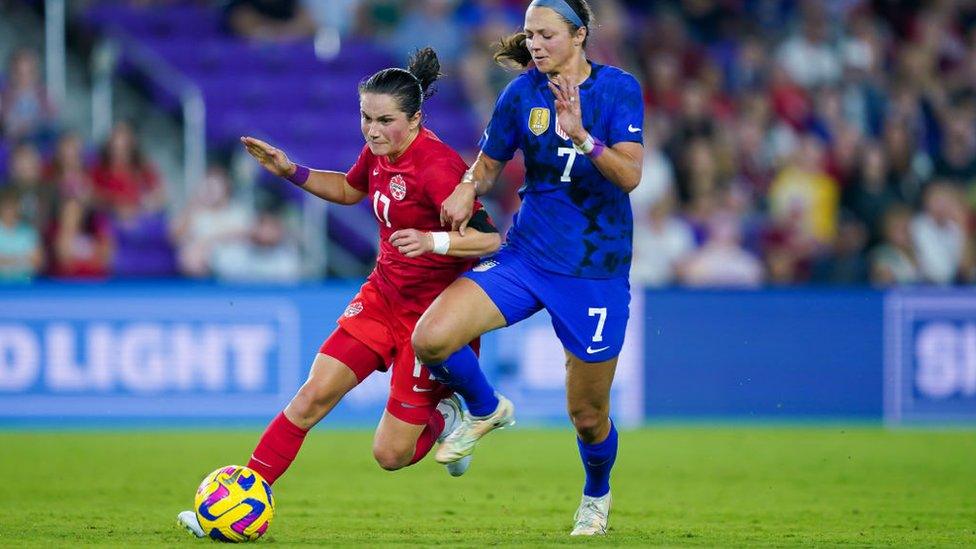
Jessie Fleming is emerging as a star on Canada's roster
The team reached an interim agreement with Canada Soccer in March, but the short-lived strike still took its toll, evidenced by a particularly poor performance at the SheBelieves Cup in February.
"Through those games you could just see we were a deflated team," Ms Sinclair said of the tournament to CBC. "We're going to battle [over funding], but when it's World Cup time, the off-field battle has to end."
Canada's team will have to face its shortcomings at the World Cup - a gruelling, month-long tournament that demands consistency across matches.
"The Olympic Games and the World Cup are two very different tournaments," Ms Rustad told the BBC.
"When you add games in the knockout phase of a World Cup, I mean the level of competition doesn't go up in a linear fashion, it goes up exponentially."
Canada has to first get past the "Group of Death", named for the particularly challenging matches to come in Group B, with Canada, Nigeria, Ireland and Australia.
The team will have a fresh target on their back after their Olympic win, but Ms Sinclair told CBC it has more to prove.
"There's still, I think, a little bit of a lack of respect from some of the top countries in the world, and we're OK with that," she said. "We're going there to win."
Additional reporting by Chloe Kim
Related topics
- Attribution
- Published10 March 2023
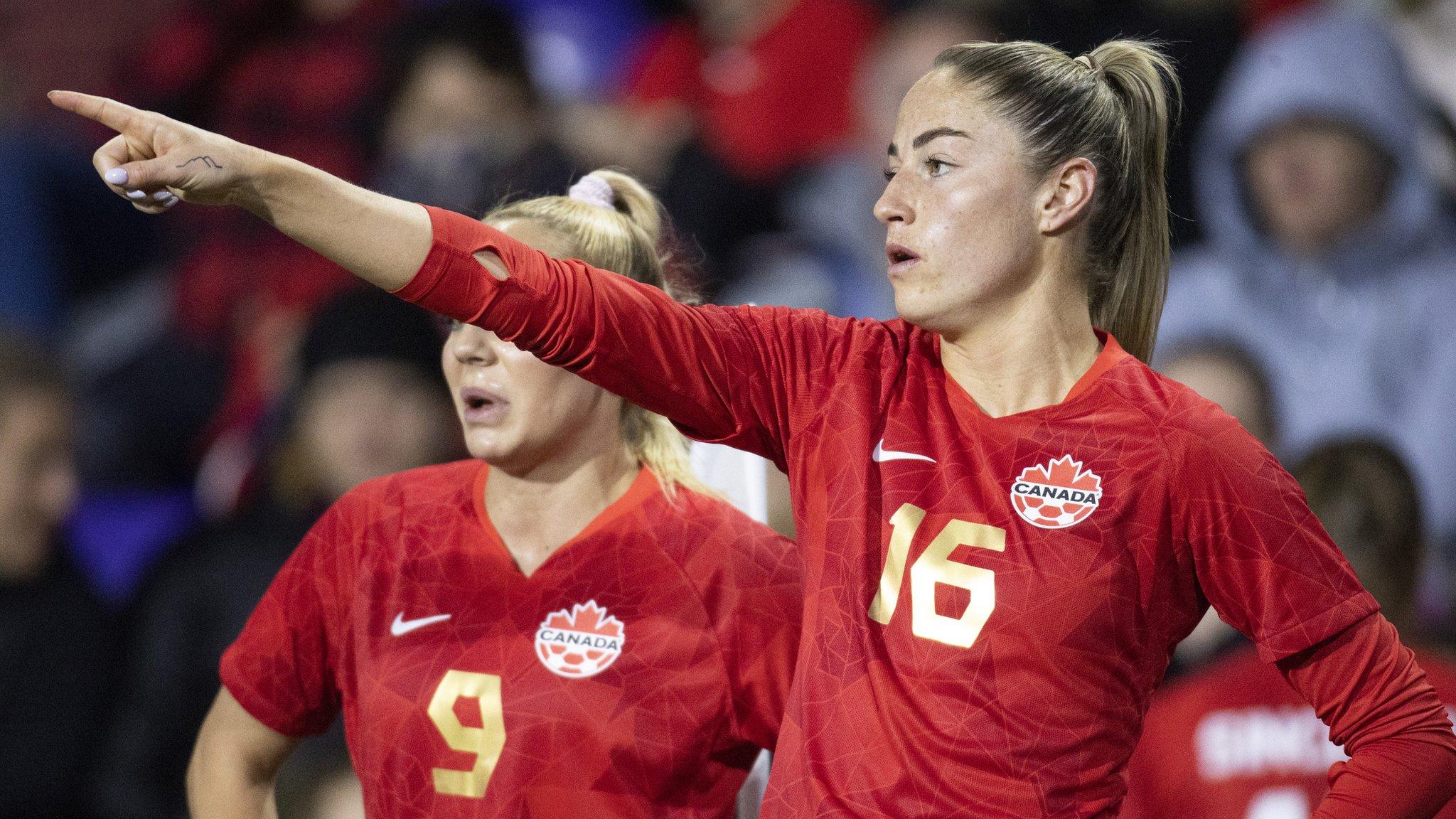
- Published14 June 2019
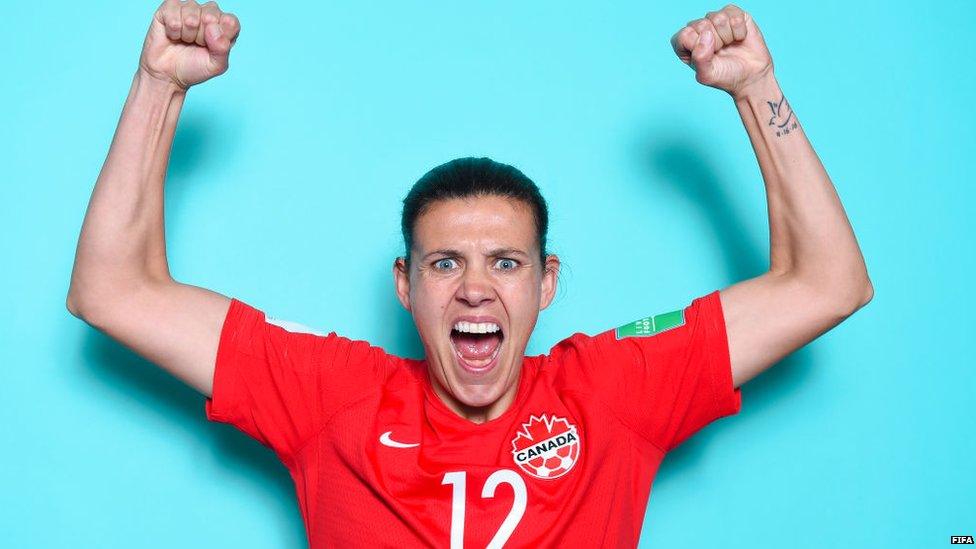
- Attribution
- Published11 February 2023
